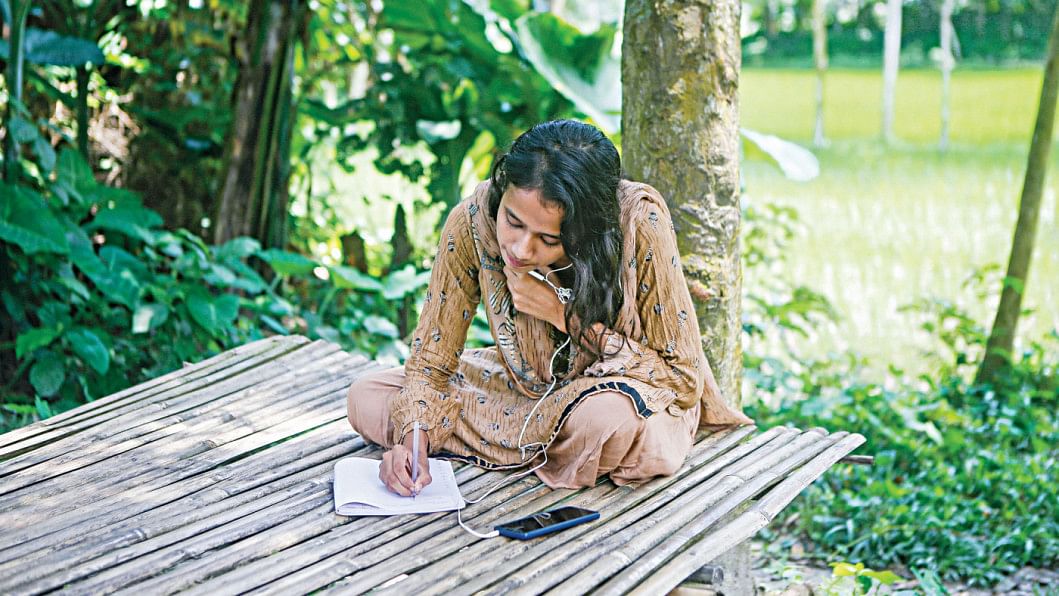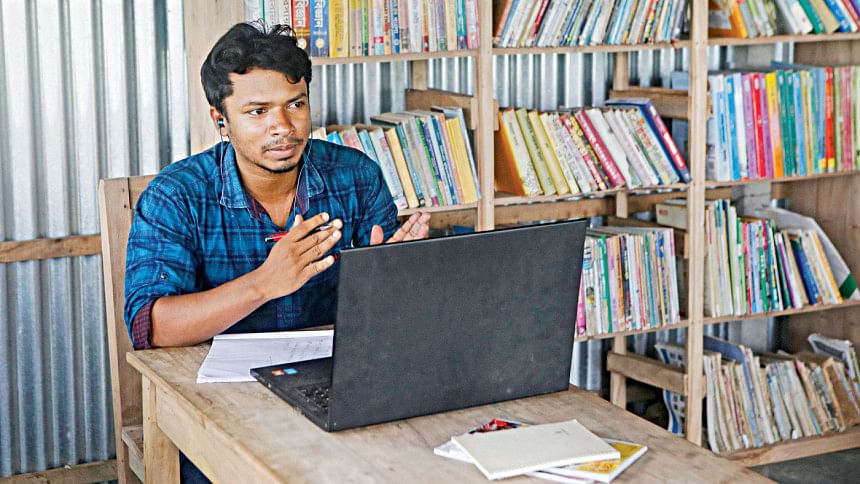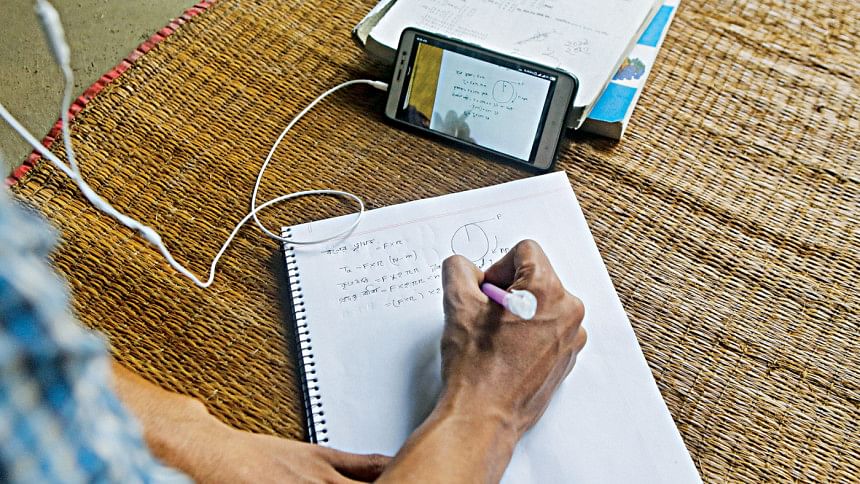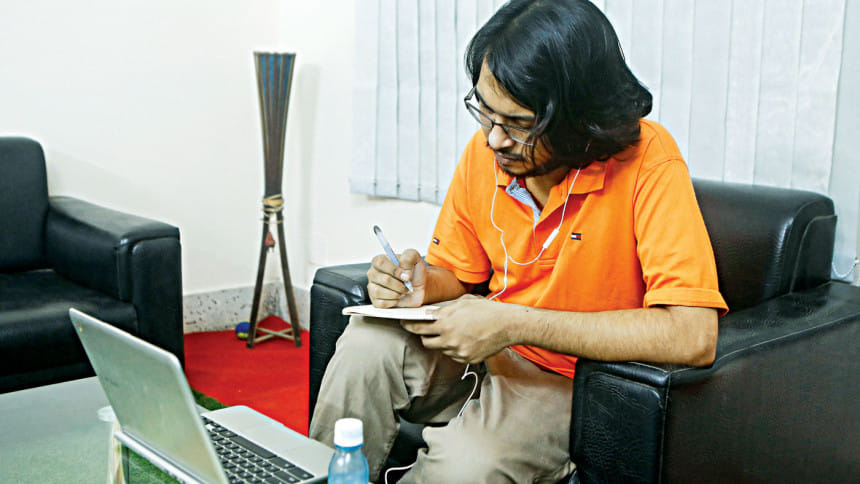The Lessons of Online Learning

Online learning has drawn criticism in Bangladesh primarily due to our unfamiliarity surrounding the concept, having never been attempted before in this magnitude. With that in mind, let's take a look at the problems students across the country have faced in attending online classes.
Is poor internet the real culprit?
As social distancing was enforced as a part of the safety measures to prevent the spread of the coronavirus, a majority of the students who stayed in Dhaka for the sole purpose of education had to return home. Students living in remote areas have been facing a lot of trouble joining online classes, the most common of which is poor internet access and connectivity. Many of them have gone to great lengths to ensure they don't fall behind their peers.
"Due to very poor internet connection at my village, I have to cover a distance of almost 2 kilometres to reach the bazaar in order to get the 3G signal required for sustaining the video stream," says Sharif Mahadi*, a student at the Department of Geography and Environment, University of Dhaka (DU), about the daily struggle he faces to attend online classes from Krishnapur, Brahmanbaria.

Covering such a distance to attend daily online classes is a major inconvenience. In an already uncomfortable setting, undesirable noises, sudden interruptions and unwanted interventions can be really distracting and demotivating.
When asked about her experience, Abinta Khanam*, a fourth-year Computer Science and Engineering (CSE) student from a reputed public university in Sylhet, now living in her hometown in Noakhali had similar things to say, "Because of the trouble of getting a stable network within my house, every time I need to join a class, I grab a chair and head to an open field right outside my house gate where the network seems much better. But this is a hassle, especially on rainy days."
Even for many students who are participating in online classes from home, the experiences have been unpleasant. "Due to an unstable network, the video lags, the audio becomes fuzzy and the streaming quality drops drastically. As a result, I miss out on the most important parts of the lecture," states Asif Hasan*, another fourth-year student at Islamic University of Technology (IUT), who attends classes from Ramkola, Nilphamari.
Has the quality of classes dropped?
Students we talked to have been quite displeased about the overall quality of classes, raising questions about the academic content being offered, the manner in which classes are being conducted, and the guidelines being conveyed from administration to students.
There have been complaints about teachers progressing with online classes as though they were being conducted in-person. It doesn't sound like a bad thing until you realise that online classes have been hovering on a middle ground between a strict rote learning system and interactive critical thinking sessions.
Faiza Alam*, a student at Sylhet's Metropolitan University (MU), commented, "As a Literature student, I'd prefer more interactive classes. Studying Literature and related courses get tiring with just lecture notes and study materials. The teachers should be more open about what they're teaching and discussing, prioritising the student's overall experience and how we can learn effectively."
It's rather evident that the channels of communication between students and teachers have become severely strained, with both parties failing to fully understand each other's shortcomings.

Sohana Zaman*, pursuing an undergraduate degree in Marketing at Bangladesh University of Professionals (BUP), spoke about her teachers, "I don't think they're always taking our disadvantages into account. I say so because my coursemates and I are tired of seeing the administration taking decisions just as suddenly as they're dropping them. It would be of great help if they thoroughly discussed a matter before finalising any decision."
Aniqa Afroze* from DU, a student of Economics, added to Zaman's statement, discussing her university's divided stance on online learning. It seems that while most universities are making the attempt to digitise their course materials, DU's administrative body is slow to handle matters, leading the students to suffer from poor handling of online classes.
Doubts have also been raised regarding teachers' capabilities with conducting online classes. Maisha Zebin*, a second-year student of Media and Communications from Independent University Bangladesh (IUB), commented on her university's administrative body failing to provide sufficient training for some of the older members of the faculty.
Abu Bakar Siddik, a BBA student from a reputed private university in Dhaka, told us, "The quality of online classes is nowhere near that of an actual university class. Most of my teachers are just busy completing the syllabus. Only a handful of students are actually getting benefitted from the lectures."
According to a lot of students, proper access to classes and course materials has been difficult to attain, with certain universities prohibiting any kind of recording of live classes. Second-year CSE student from University of Asia Pacific, Showkot Iqbal* shared his thoughts, "I think they should make a reliable platform like HarvardX or MIT OpenCourseWare where they can provide pre-recorded classes, which we'd be able to access without any time-related hassles."
Similar measures have been put in place by Brac University (BracU) with the creation of the BuX platform where students can access all their required course materials.
We reached out to Dr. Hasan Mahmud Reza, Dean of School of Health and Life Sciences at North South University (NSU) in Dhaka, for comments on dealing with the aforementioned issues. In response to students expressing dissatisfaction with the online assessments, Dr. Reza commented, "NSU is working hard towards acquiring a world-class LMS (Learning Management System) pretty soon. We'll then be able to ensure better proctoring and fairer examination conditions for all our students."
Whether or not other universities will follow NSU's footsteps is dependent on the LMS' success in a Bangladeshi university, which remains to be seen.

Do socio-economic conditions have a role to play?
Many students coming from low-income families lack access to digital devices needed and are at a major disadvantage.
Nabil Mahmud*, a second-year student of science from DU shared that while residing in the university hall, he completed his work either using the computer lab of his department or managing a laptop from one of his friends. Since the halls closed due to the pandemic, he was forced to return to his village in Kushtia and had to borrow a laptop to complete his assignments.
According to research by a2i, over 20.4 million workers are currently unemployed across eleven high-impact sectors of the economy. Maruf Imtiaz*, a BBA freshman at a public university in Savar expressed his concern about the financial instability of his family as both his father and elder brother had recently lost their jobs, stating that he is in no position to attend online classes.
Having to take part in multiple online classes per day requires a considerable amount of mobile data, affording which is tough for underprivileged students who don't have access to broadband internet. In order to ease their pursuit of online education, the University Grants Commission of Bangladesh (UGC) urged the government to introduce free internet packages for public university students and even sought financial assistance for students who need to buy smartphones to take part in online classes. In addition, the Association of Private Universities of Bangladesh demanded the introduction of affordable internet packages for private university students.
In our interviews, we've found that some private universities have waived part of their tuition fees. Public universities such as Shahjalal University of Science and Technology (SUST) in Sylhet have opted to provide 15 GB of mobile data, monthly, to 20 students per batch who cannot afford to buy data packs.
Are mental and developmental disorders being considered?
Meanwhile, students attending online classes at home are not at all free of inconveniences. There are those who fear the adverse effects of a sedentary lifestyle on their health, and those who are concerned with grief and panic spreading like wildfire.
Liakat Sheikh*, a third-year engineering student at Military Institute of Science and Technology (MIST), told us that he is unable to concentrate in online classes when two of his family members have been tested positive for coronavirus.
Tonmoy Saha*, a student majoring in CSE from American International University Bangladesh (AIUB), said, "My lecturers are more focused on cramming as many assessments possible instead of actually teaching us. We have to sit around anxious for entire days because assessments are broken down into segments held intermittently throughout the day."
We also spoke to students struggling to adapt to digital classrooms. Having grown accustomed to living by themselves in student hostels, they're now unable to concentrate in the absence of the tranquility required to work and complete assessments. Shahriar Arpon, a fourth-year engineering student from BUP, shares, "In spite of facing several issues at home, missing my attendance is a price I cannot pay. So, I've got no choice but to attend my classes."
In the interviews conducted, students have talked about neuro-developmental disorders that have caused difficulties in adapting to online classes.
A third-year student in BracU's English and Humanities department, Joyeeta Das* cited learning disabilities as a factor not being taken into consideration by her university's admin, and commented on online classes, "A lot of the text material provided are either unavailable in dyslexia-friendly fonts or can't be deemed text-to-speech friendly." No known measures have been put into place for online classes in Bangladesh to accommodate students suffering from developmental disorders of any kind.
An officer from NSU's Student Counselling Center, Md Shaphawat Hossain, provided some personal insight into students' current state of distress, "After NSU began hosting their student counselling sessions online, the initial response from students was overwhelming. A large number of students expressed feeling uncomfortable with online classes as they weren't able to interact with their classmates and teachers like they used to in physical classrooms."
The pandemic has wreaked havoc on almost everything we considered normal. We spoke to several students across Bangladesh seeking to understand their perspective, lend an ear to their voices on what online classes have been like for them. While answers varied throughout, their plea remained constant, "We just want some clarity and cooperation from both our universities and our government, during these trying times."
*Names have been changed for privacy reasons.
Reference
A2i. (2020). Post Covid-19 Jobs & Skills in Bangladesh.
Watch the students share their experiences with online classes here.
Rasha Jameel is trying to figure why she needs to write a dissertation for 2 marks in her Genetics assignment. Send her your theories at [email protected]
H. Rainak Khan Real still has trouble sleeping at night thinking about his 3rd Year Field Report. Send him tips to sleep soundly at [email protected]

 For all latest news, follow The Daily Star's Google News channel.
For all latest news, follow The Daily Star's Google News channel. 



Comments